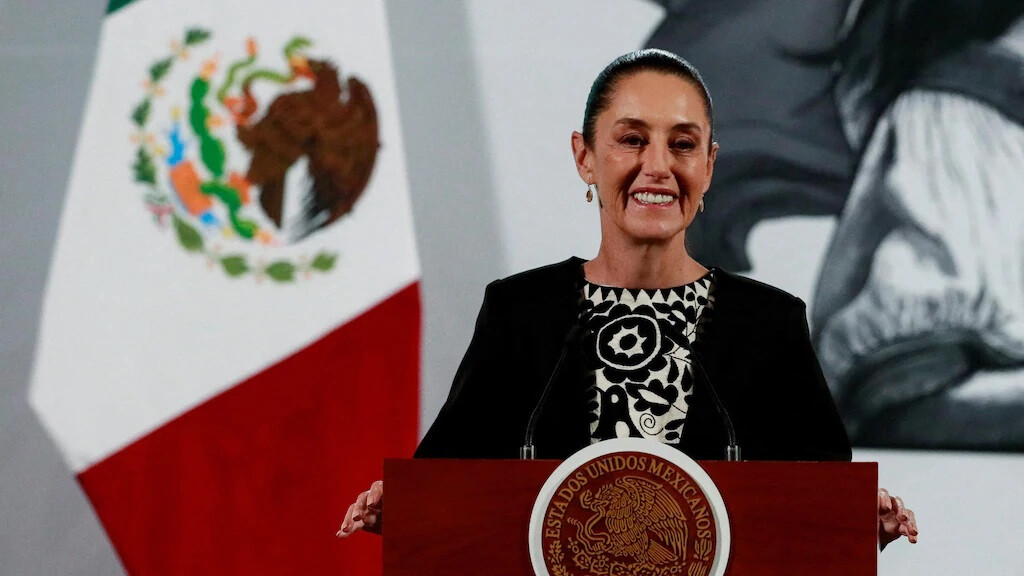
In a resolute defense of national sovereignty, Mexican President Claudia Sheinbaum has publicly rebuffed a proposition from U.S. President Donald Trump to deploy the American military within Mexico's borders to combat drug cartels. Speaking to a gathering of supporters in the eastern part of the nation, President Sheinbaum addressed recent reports detailing a contentious phone conversation with President Trump, reiterating her unwavering stance against foreign military intervention on Mexican soil.
The controversy stems from a Wall Street Journal report outlining a call last month between the two leaders. According to the report, President Trump pressed President Sheinbaum on the need for a more substantial U.S. military role in dismantling the powerful and deeply entrenched drug cartels operating within Mexico. President Sheinbaum directly addressed this account, stating, "President Trump offered, 'How can we assist in your fight against drug trafficking? We are prepared to send the U.S. military to help.' To this, my response was unequivocal: 'President Trump, no.'" Emphasizing the foundational principle at stake, she declared, "Sovereignty is not a bargaining chip; it is a cherished value that we must safeguard and hold dear."
While the White House has yet to issue an official response to President Sheinbaum's public comments, her firm and direct rejection underscores a significant point of contention between the two nations. It represents a direct challenge to the approach favored by the U.S. administration, which has increasingly viewed the cartel presence in Mexico as a national security threat demanding assertive action, potentially including military measures.
The U.S. government under President Trump has consistently portrayed Mexican drug cartels as a grave danger, even taking the significant step of labeling them as "foreign terrorist organizations." This designation, formalized on February 19th, triggered a range of punitive measures aimed at crippling the cartels' operations, including the freezing of their financial assets, the imposition of travel restrictions on their members, and the potential seizure of their holdings within the United States. Beyond these financial and legal pressures, the U.S. has also intensified its military posture along the shared border, deploying additional troops and bolstering aerial surveillance activities aimed at disrupting the flow of illicit narcotics.
Despite this escalating pressure from the north, President Sheinbaum's pronouncements signal a clear red line for Mexico. Her emphatic statement, "We can collaborate, but this collaboration must occur within the confines of our respective territories. The presence of U.S. military forces within Mexican territory is utterly unacceptable," resonated deeply with a populace historically wary of foreign intervention. This sentiment is rooted in past experiences and a strong sense of national pride, factors that the Mexican government cannot afford to ignore.
Experts in U.S.-Mexico relations anticipate that President Sheinbaum's firm stance will have considerable ramifications for bilateral ties. The U.S. strategy for combating drug trafficking relies, to a significant extent, on cooperation from Mexican authorities. Without Mexico's active participation and consent, the effectiveness of any unilateral U.S. military action would be severely limited and could potentially be counterproductive, inflaming nationalist sentiments and hindering collaborative efforts.
The current impasse highlights a fundamental divergence in how the two nations perceive and seek to address the complex issue of drug trafficking. The U.S. appears to be leaning towards a more coercive approach, leveraging military power as a potential tool to compel Mexican action. Conversely, Mexico firmly advocates for a solution based on mutual respect for sovereignty, genuine collaboration within established legal frameworks, and addressing the root causes of the drug trade.
The unfolding situation places a significant spotlight on the future trajectory of U.S.-Mexico relations and the strategies that will be employed to tackle the persistent challenge of drug trafficking. The international community will be closely observing whether the two neighbors can navigate this delicate issue through constructive dialogue and find a path forward that respects national sovereignty while effectively addressing shared security concerns. The interplay between Mexico's commitment to its sovereignty and the U.S.'s pursuit of its security objectives will undoubtedly shape the dynamics of this crucial bilateral relationship in the years to come.
[Copyright (c) Global Economic Times. All Rights Reserved.]






























